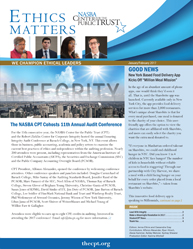Lead With Integrity: Do I Know It All? (Jan./Feb.) 2017
Ethics Matters
January – February 2017
 As we roll full speed into 2017, I am compelled to share thoughts and perspectives on ethical decision-making this year, based on encounters I have with interesting individuals from across the country. My travels give me the opportunity to engage with people, ranging from future leaders in the workforce on college and high school campuses to executives at the highest levels in business and government. The questions I receive after a speaking engagement are often fascinating and can benefit us all. I look forward to sharing them with you.
As we roll full speed into 2017, I am compelled to share thoughts and perspectives on ethical decision-making this year, based on encounters I have with interesting individuals from across the country. My travels give me the opportunity to engage with people, ranging from future leaders in the workforce on college and high school campuses to executives at the highest levels in business and government. The questions I receive after a speaking engagement are often fascinating and can benefit us all. I look forward to sharing them with you.
A few weeks ago, an executive (we will call him Bob) asked my advice on an ethics situation. A few minutes into the conversation, we discovered he was about to make a common mistake. He was
close to making an important personnel decision without knowing and analyzing all the facts.
When making an ethical decision, it is imperative to know all (or as many as time will dictate) the facts needed to make the best decision. In fact, to make the best decision, all possible scenarios leading to the decision must be investigated, along with the potential outcomes of the decision. This can only be accomplished if we first seek and uncover the facts in the situation.
How we get to the facts is not always easy. One way we can quietly learn what we need to know is looking at the data in the situation. By looking at data, we give ourselves the best opportunity to uncover unbiased information that leads to the facts. From data, we also see trends that help us understand the scope and impact of the situation.
Looking at the data alone, as the executive I referenced earlier did, does not always illustrate the total picture. In many situations, the data helps us determine the best questions to ask other stakeholders. The combination of the questions and the data analysis is best used to uncover and analyze the true facts in a situation.
Bob discovered he was about to make a major decision based on data given to him by his team. However, he had not spoken with anyone directly involved with the project yielding the data. He also had not considered the impact on customers using the services. At the end of our conversation, Bob had a different approach that would cost him an additional day of fact gathering, but he was sure this process would bring him to a better decision.
In 2017, before you make a major decision, ask: “Do I know it all?”
— Analyze all the Facts and Lead with Integrity.
Alfonzo Alexander
President, CPT
CRO, NASBA




